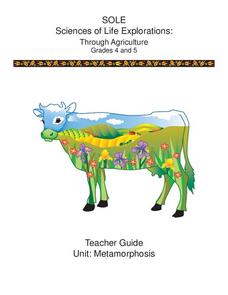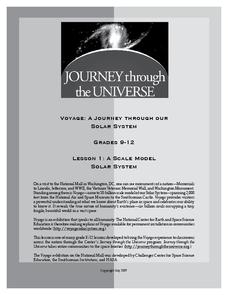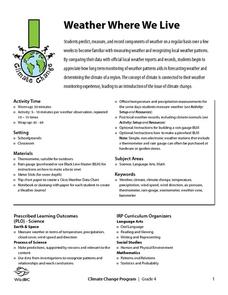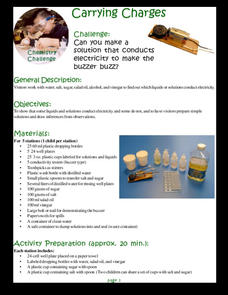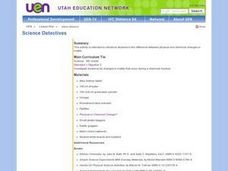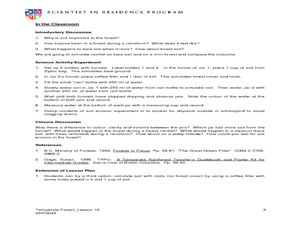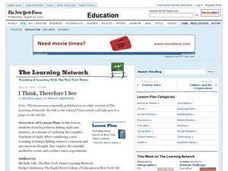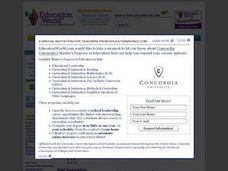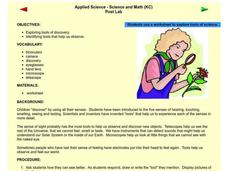Cornell University
Metamorphosis
Looking for an insect unit that addresses multiple skill strategies? Young entomologists explore multiple life cycles of insects that go through metamorphosis. The brainteasers and mobile activity spark learner interest before guiding...
Journey Through the Universe
A Scale Model Solar System
Between the time scientists discovered Pluto and reclassified it as a dwarf planet, it did not even make one full revolution around the sun. In two activities, scholars investigate scale models and their properties. Pupils find that it...
Wild BC
Weather Where We Live
Over a span of two weeks or more, mini meteorologists record weather-related measurements. What makes this particular resource different from others covering similar activities are the thorough details for the teacher and printables for...
University of Colorado
Rings and Things
Galileo first observed Saturn's rings in 1610. Through the use of a flashlight and baby powder, classes see how they can observe the rings of the outer planets from far away. Another demonstration shows how these rings, made of ice and...
BioEd Online
Muscle Fibers
What better way to learn about muscle than by dissecting one? Using cow muscle (beef), learners compare bundles of yarn to muscle fibers as they explore each. The supplemental reading about astronauts losing muscle mass in space and what...
Curated OER
Viewing Bacteria
Have you ever wanted to know the true structure of E.coli? Does the thought of peering into its "small world" sound exciting? Here is a lesson that allows pupils the ability to do just that. Blossoming microbiologists use...
Polar Trec
Do Microorganisms Live in Antarctica?
Can microorganisms live in the dry, cold climate of Antarctica? Young scientists view a research project measuring microorganisms in the Taylor Glacier. They record the findings from dirty ice, clean ice, boots, sediment, and more. Then...
Sciencenter
Carrying Charges
What's all the buzz about electricity? Scholars take part in a scientific activity to test the conductivity of liquids and solutions. They first see if water, salad oil, alcohol, and vinegar cause a buzzer to buzz when electrodes are...
National Wildlife Federation
It's All in the Name: Weather Versus Climate
What goes up when rain comes down? An umbrella! Activity eight in the series of 12 explores weather and climate. In pairs, participants analyze maps, watch a short video, create a weather forecast, and complete a reading to determine the...
Pennsylvania State University
Learn, Protect, and Promote Water
A hands-on activity helps learners explore the water cycle. After discussing how they use water, classes discuss water pollution and then move into a simulation where 20 pupils move through the water cycle based on description cards.
University of Minnesota
Memory Box
Teachers encourage using memory tricks, but do they actually work? Scholars test word association in a short yet engaging activity. They use 10 seconds to memorize as many items as possible and determine if they are more successful if...
Curated OER
Move It!
Third graders examine simple machines. In this simple machines instructional activity, 3rd graders observe simple machines at work in a video, then experiment with creating their own simple machines to move objects.
Curated OER
What Can We Lose? What Do We Lose as we Gain Force With A Lever?
Third graders view a demonstration of a teeter totter as a basis for assessing pre-knowledge of a lever. They create a KwL chart. Students work in small groups to conduct a variety of experiments. The first requires students to tie books...
Curated OER
Science Detectives
Fifth graders examine the differences between chemical and physical changes. As a class, they are read a scenerio and determine whether it was deliberate act or not. In groups, they observe the changes of an alka-seltzer tablet and...
Curated OER
Levers: Catapults
Students construct a catapult that shoots a cotton ball at least two meters using Legos, rubber bands, and plastic spoons. They discuss how the catapult works, and identify any problems they had with their experiment.
Curated OER
Don't Trash the Earth
Middle schoolers experience a hands-on environmental science project. They access about recycling as they collect data on their own family's trash production. Students analyze the data with worksheets, chart the data, and present their...
Curated OER
Bottle Rocket Launcher
Students construct a bottle rocket launcher for use with the Bottle Rocket and Project X-35 activities. They construct a bottle launcher from "off-the-shelf" hardware and wood using simple tools.
Curated OER
Forest as a Filter
Students experiment using soil and water. For this forest as a filter lesson, students identify the role of forest cover, vegetation, and foliage impacts erosion and evaporation. Students conduct a simple experiment, form a hypothesis,...
Curated OER
I Think, Therefore I See
Students participate in a memory experiment to discover how the eye works. After reading an article, they analyze a new technique which examines how the brain registers sight. They develop their own memory game and conduct trials using...
Curated OER
Biomolecules
Students perform an experiment in which they test foods for the presence of proteins, carbohydrates, and lipids. They identify the molecular structure of each type of biomolecule and then discuss how biomolecules relate to nutrition and...
Curated OER
Let it Shine
Fifth graders investigate concepts of electricity by watching a video about Ben Franklin, participating in a web activity about simple circuits and experimenting with creating simple circuits. They examine conductors and insulators.
Curated OER
Make A Mummy: The Science of Mummification
Students research the history of mummification. They work together to create an apple mummy. They write a paragraph about what they gathered while doing the experiment.
Curated OER
Science: Flight Aerodynamics
Students apply the principles of aerodynamics by constructing styrofoam airplanes. By using simple tools and materials, they improve their spatial visualization abilities while increasing motor skills. After small groups of students...
Curated OER
Applied Science - Science and Math Post-Lab
Students use scientific tools. In this Applied Science lesson plan, students investigate the use of scientific tools to enhance observation and discovery. Students indicate how each tool assists scientific work.
